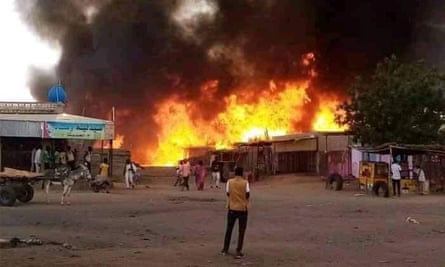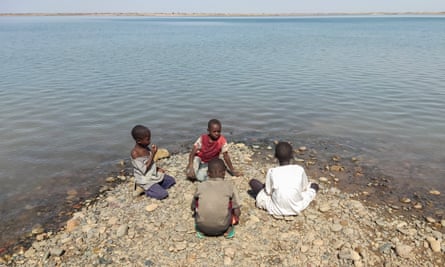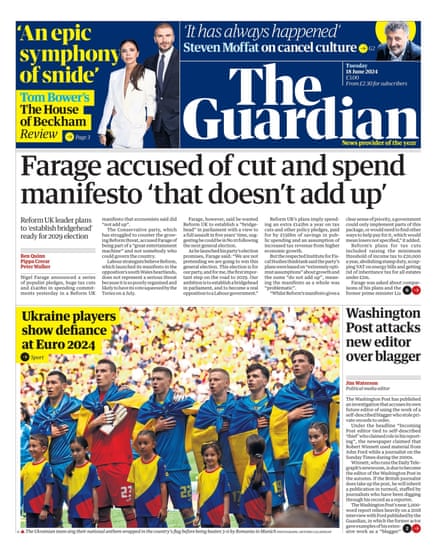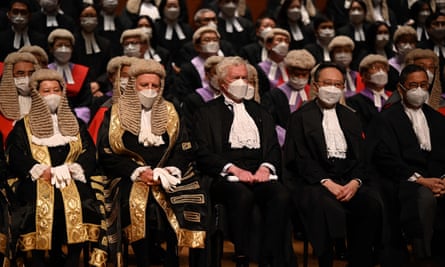Good morning.
The war in Sudan has caused destruction throughout much of the country. And with every passing week the conflict seems to get worse between the Sudanese army and the Rapid Support Forces (RSF) – a paramilitary group who say their main goal is to establish democracy, though the frequent human rights abuses they commit do not support this claim.
Fourteen thousand people have been killed and there are credible reports that Darfur, in western Sudan, may be heading towards another genocide. The situation is continuing to deteriorate to catastrophic levels, with reports from US officials now warning that Sudan is facing a famine that could become worse than any the world has seen since Ethiopia’s in the 1980s, which killed a million people between 1983 and 1985 and is considered one of the worst humanitarian events of the 20th century.
According to the World Food Programme nearly 18 million people are facing acute hunger in Sudan, 5 million of whom are in emergency levels of hunger. A food security expert who has worked in Sudan told the BBC that he expected about 70% of the population to be in a state of extreme hunger by September. Despite aid agencies attempting to alleviate the pressure and mitigate the damage of a famine, the violence and restrictions to movement have prevented organisations getting aid to parts of the country.
For today’s newsletter I spoke with Mandeep O’Brien, the country representative for Unicef Sudan who is in Port Sudan, about the humanitarian crisis that is gripping the north African country. That’s right after the headlines.
Five big stories
-
Conservatives | Jeremy Hunt said Liz Truss’s economic ambitions were a “good thing to aim for” and her disastrous mini-budget hadn’t left an impact on the economy, according to two leaked recordings obtained by the Guardian. The chancellor was recorded at a meeting of students when he said he was “trying to basically achieve some of the same things” as the former prime minister, but that he was doing it “more gradually”.
-
Israel | Benjamin Netanyahu has dissolved the Israeli war cabinet that had been overseeing the conflict in Gaza, rebuffing his far-right allies who had been seeking seats, and apparently moving to solidify his grasp on decision-making over the fighting with Hamas in Gaza and Hezbollah across the Lebanese border.
-
Italy | At least 10 people died and dozens were missing after two separate shipwrecks close to the Italian coast, rescuers said. Ten bodies were found on Monday in the lower deck of a wooden boat in the central Mediterranean by rescuers from Nadir, a ship operated by the German charity ResQship.
-
Germany | Eight alleged members of the German far-right Reichsbürger are to go on trial accused of a plot to violently overthrow the state, in the third in a row of similar court cases being held across the country. The defendants, including a GP, a celebrity chef and an astrologer, are accused of serving as the plot’s leadership council and, prosecutors say, were set to become a cabinet in waiting if the group’s plan overthrow the government had succeeded.
-
UK news | Officers who hit an escaped cow with a car “probably did the right thing at the time” even if it looks “horrendous”, a union leader and farmer has said. A video showing a police car hitting the calf on Friday night on a residential street in Staines-upon-Thames was met with widespread outrage, including from the RSCPA which criticised it as “disproportionate”.
In depth: ‘They want the war to stop’

Before the war began, Sudan was already experiencing many humanitarian problems. According to the World Bank, in 2021 over 40% of households in Sudan did not have access to basic water services and 67% did not have access to basic sanitation. The war has “aggravated” and “entrenched” these crises, O’Brien says, making day to day life “a living nightmare” for many.
The war has devastated Sudan’s economy, leaving people in further states of destitution. More than 9 million have been displaced, and with a further 2 million pushed into bordering countries, Sudan has the largest displacement crisis in the world. Over four million of the internally displaced are children, meaning that Sudan also has the world’s largest child displacement crisis, according to Unicef.
Those who fled for their lives left behind businesses and jobs – and land that was once used for agriculture but has been turned into a “battleground”. The result has been eye-watering hyperinflation which rose to 146% in 2023, with food prices now 350% above the five-year average.
Some of the most “bone-chilling” stories that O’Brien has heard are the ones about displacement, she says. “I have travelled to seven states in Sudan since the war started, and hearing horrific and harrowing stories of people running away from the fighting but not knowing where they are heading has been extremely disturbing,” particularly as “they are highly vulnerable to risks of sexual exploitation and abuse”. In April, the UN found that sexual violence has been wielded in Sudan as a “weapon of war” and used “indiscriminate of age and devoid of mercy”.
Perhaps most acute is the hunger. Western Darfur, where the threat of starvation and famine is highest, has been almost entirely cut off from humanitarian aid. Deliveries of food have slowed significantly in regions that were already reliant on them before the war, as both sides stand accused of embracing starvation as a weapon of war. “I would say, pretty confidently, that Sudan is going through a humanitarian catastrophe of epic proportions.”
The children

Sudan has a very young population: approximately half are under the age of 18. “The 24 million children in Sudan are bearing the heaviest burden of this brutality,” O’Brien says.
Many of these children have been separated from their families and displaced within the country. The child displacement crisis has within it multiple other crises that together could create a “lost generation”, O’Brien says. 90% of the 19 million children of school age are not in school. “What is the future of a country in terms of learning and productivity if most of the population are not in school?” she says. On an even more basic level children are at risk of contracting highly preventable diseases like cholera because of a lack of access to clean water and sanitation.
Despite the difficulty for many aid organisations to stay in war-torn Sudan, Unicef never left and has been delivering crucial medical aid and food to children as well as offering some mental health counselling. Part of the therapeutic work has been through child-friendly safe spaces where children can freely express themselves through art. O’Brien says she distinctly remembers infants’ drawings “of dead bodies, blood and bullets because that was the horror from which these children had to flee”.
A path forward
None of the proposed political solutions have led to a ceasefire, permanent or temporary. Despite a resolution that was passed by the UN security council calling for a complete cessation of the hostilities, the last few weeks have seen an escalation of violence in El Fasher, where the fighting has been so fierce that there are serious concerns of genocide in the region. Attempts to mediate between the sides have so far proven fruitless.
O’Brien says there are many stories of resilience that show a more hopeful path for the people of Sudan. “I would say that while people in Sudan are enduring all this pain and horror, they are still wanting and needing to live on. I have spoken to many families and my own staff, who have been displaced twice, thrice, sometimes even four times and have lost everything but still want to survive. They want the war to stop.”
What else we’ve been reading

-
As House of the Dragon roars back on to screens, Tom Huddleston’s got fans covered with a weekly Guardian recap blog. Plus: sign up for our What’s On newsletter for more small-screen news and views. Hannah J Davies, deputy editor, newsletters
-
More than 125 birds are thought to be lost to science as they have not been spotted in more than a decade. Phoebe Weston has spoken with the people who have not lost hope. Nimo
-
I loved this piece about whether the remix – once the king of the charts – has had its day. Hannah
-
Lanre Bakare went to Hackney North, the constituency of veteran Labour MP Diane Abbott, to find out how bad the damage to Labour’s relationship with black voters has become. Nimo
-
“I used to take one camera – now I bring a van of them”: Emine Saner meets the wedding photographers living up to couples’ increasingly high, social media-fuelled standards.” Hannah
after newsletter promotion
Sport

Euro 2024 | France beat Austria 1-0 in Düsseldorf thanks to Maximilian Wöber’s own goal, but Kylian Mbappé was forced off with a bloody nose that was later confirmed as broken putting his next match in doubt.
Golf | Rory McIlroy is likely to be haunted by letting the 2024 US Open slip through his fingers at Pinehurst, according to a number of high-profile pundits, with his own coach questioning how he can come back from such a devastating loss.
Tennis | Jack Draper says he has far loftier goals than becoming British No 1 and he will tackle his next challenges with a renewed self-belief as he looks to follow up his breakthrough title run in Stuttgart with more great performances on home soil at Queen’s Club this week.
The front pages

The Guardian has for its splash “Farage accused of cut and spend manifesto ‘that doesn’t add up’”. “Farage – it’s ‘impossible’ to know if Reform would keep low-tax pledge” says the i while “Tories turn to Johnson to counter Reform” is the front-page lead in the Daily Telegraph. “Rishi – Keir only wants votes at 16 to ‘entrench his power’” – the Daily Mail headline suggest the leaders are going around calling each other by their first names. “Banking giant’s dire warning on Labour pledges” – that’s the Daily Express, which supports Rishi, and HSBC is the bank not liking Keir’s plan to boost workers’ wages. “Don’t risk a generation of socialism, warn Tories” says the Times. “Hero patient stopped bomber killing nurses” reports the Metro. Top story in the Financial Times is “French bosses build ties with Le Pen as left triggers alarm”. “Message from Frankfurt: Willkommen England”, says the Daily Mirror – softening a warning from German police for troublemakers to stay away from Thursday’s Euro match.
Today in Focus

The British judges ruling on the law in authoritarian Hong Kong
Since 1997 Hong Kong’s highest court has included British judges. But with China changing the laws in the city, they are being urged to resign. Amy Hawkins reports
Cartoon of the day | Ben Jennings

The Upside
A bit of good news to remind you that the world’s not all bad

Noted environment fans Coldplay are going a step further for their new record, and are aiming to launch the world’s most planet-friendly vinyls. LP copies of their new album Moon Music, released on 4 October, will be made from nine recycled plastic bottles each, cutting emissions by 85% compared with usual methods of vinyl production and preventing the manufacture of 25 tonnes of new plastic.
It’s just the latest environmentally friendly move from the band, who reduced their carbon footprint by 59% on their most recent tour, compared with the one prior. As well as avoiding plane travel where they could, they also made use of technology such as “kinetic dancefloors” which utilise the movement of a crowd to generate energy.
Sign up here for a weekly roundup of The Upside, sent to you every Sunday
Bored at work?
And finally, the Guardian’s puzzles are here to keep you entertained throughout the day. Until tomorrow.
-
Quick crossword
-
Cryptic crossword
-
Wordiply
Source: theguardian.com


















